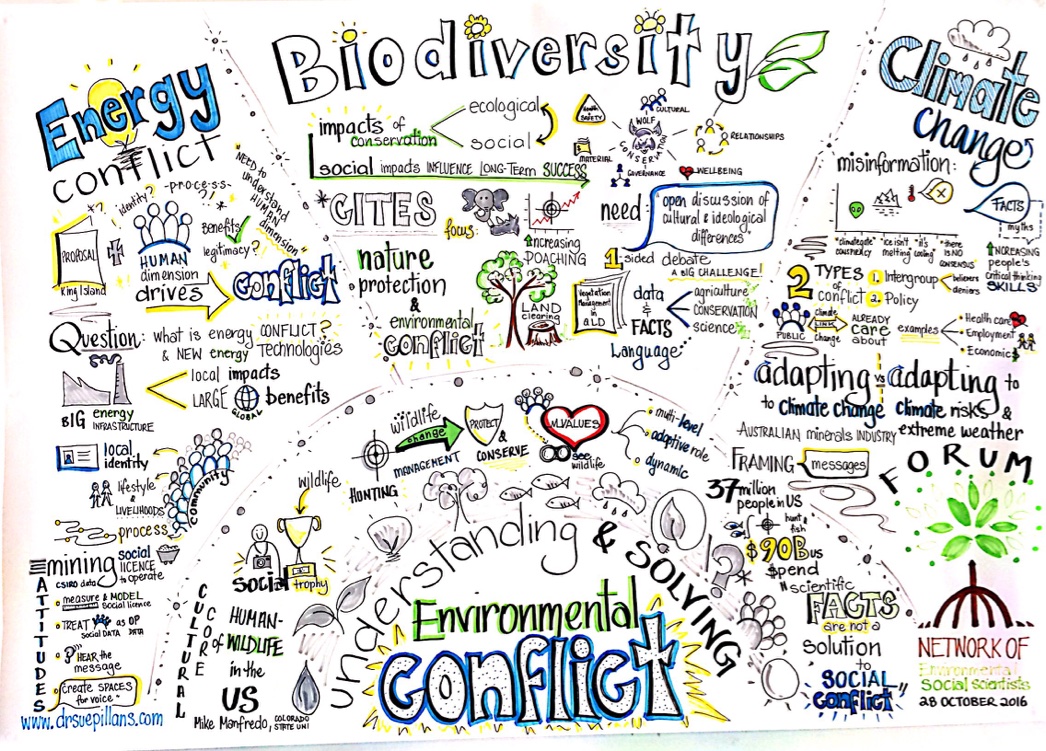

Visual story created by Dr Sue Pillans © 2016 www.drsuepillans.com
October 28th 2016
Environmental challenges are often marked by conflict: political conservatives and progressives are divided on climate change, communities oppose local energy initiatives, and conservation initiatives are opposed by vested interest groups. Environmental conflict strains relationships between people and groups, lowers the wellbeing of the people and communities involved, and causes decision-making to stagnate. This matters, because timely policy buoyed by social acceptance is known to be critical for successful environmental outcomes. Though many disciplines have been grappling with environmental conflict for decades, to date there has been little cross-pollination of ideas, theories, and practices. Through identifying common themes across disciplines, the forum aims to share knowledge and experiences to better understand – and potentially solve – environmental conflict.
Check out the #EnvConflict twitter action from the forum here on Storify
Our speakers (with available presentations and research papers linked):
KEYNOTE
Professor Michael Manfredo (Colorado State University)
– Why social values cannot be changed for the sake of conservation
ENERGY CONFLICT
Rebecca Colvin (School of Geography Planning & environmental Management, UQ)
– How wind became a four-letter word: Lessons for community engagement from a wind energy conflict in King Island, Australia
– The social identity approach to understanding socio-political conflict in environmental and natural resources management
Professor Peta Ashworth (Sustainable Energy Futures, UQ)
Dr Justine Lacey (Land and Water, CSIRO)
– The social licence to operate: A critical review
– Understanding the social licence to operate of mining at the national scale: a comparative study of Australia, China and Chile
– The paths to social licence to operate: An integrative model explaining community acceptance of mining
– Maintaining legitimacy of a contested practice: How the minerals industry understands its ‘social licence to operate
– Australian attitudes to mining
– Chilean attitudes to mining
– Chinese attitudes towards mining
– Assessing Citizens’ Attitudes Towards Mining: Zambia Pilot
BIODIVERSITY CONFLICT
Cristina Romero (School of Geography Planning & environmental Management, UQ)
Dr Duan Biggs (Environmental Futures Research Institute, Griffith University)
Dr Tim Seelig (Queensland Conservation Council)
CLIMATE CHANGE CONFLICT
John Cook (Global Change Institute, UQ)
Dr Paul Bain (School of Psychology, QUT)
Liese Coulter (School of Environment, Griffith University, formerly NCCARF)
Join us and our speakers on Twitter:
- NESS: @NESS_Aus
- Rebecca Colvin: @Bec_Colvin
- Justine Lacey: @justinelacey_au
- Cristina Romero: @cromerodd
- Duan Biggs: @duanbiggs
- Tim Seelig: @Tim_Seelig_Aus
Thanks to Dr Sue Pillans for visually capturing the themes at the forum.
Photos
Visual story created by Dr Sue Pillans © 2016 www.drsuepillans.com



